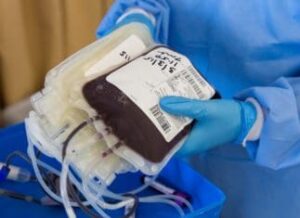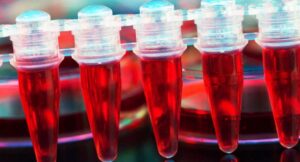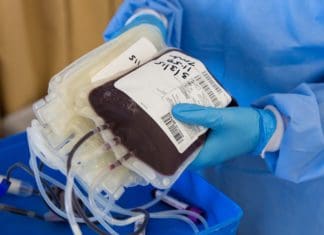In a historic clinical experiment, laboratory-grown blood has been administered to humans for the first time. According to U.K. researchers, this procedure could greatly advance the care of patients with blood diseases and unusual blood types.
As part of a larger trial to determine how lab-grown blood reacts in the body, two patients in the U.K. received modest amounts of it, or a few teaspoons, in the initial phase. The trial’s objective is to compare the longevity of lab-grown cells with infusions of regular red blood cells over several months. It will now include 10 participants.
The majority of transfusions will still be made up of conventional human blood donations, according to researchers. However, the method might enable researchers to produce extremely uncommon blood types that are hard to find but essential for those who require routine blood transfusions for illnesses like sickle cell anemia. Dr. Farrukh Shah, medical director of Transfusion for NHS Blood and Transplant, one of the project participants, said that this world-leading research sets the foundation for the manufacturing of red blood cells that can be utilized to transfuse people with illnesses like sickle cell.

Still, a significant portion of the blood will need to be collected through routine blood donations. However, there is a significant chance that this research will help patients who are difficult to transfuse, she continued. The study, which was conducted by researchers in Bristol, Cambridge, and London as well as NHS Blood and Transplant, focuses on red blood cells, which move oxygen from the lungs to the rest of the body. Magnetic beads were first utilized to find flexible stem cells that can develop into red blood cells from a routine blood donation. Then, in a lab, the stems were submerged in a nutritional solution. The treatment encouraged those cells to multiply and grow into more mature cells over about three weeks.
The cells were then preserved and later transfused into the patients after being filtered with a conventional filter (the same kind of filter used when regular blood donations are processed to eliminate white blood cells). The lab-grown blood was labeled for the trial with a radioactive material, which is frequently used in medical operations, to track how long it persists in the body. To compare the cell lifespans, the same procedure will now be used on a group of 10 volunteers who will each get two donations of blood, one of normal blood and the other of lab-grown blood, spaced at least four months apart.

The longer lifespan of lab-grown cells is also anticipated to lead to patients requiring fewer transfusions in the future. Because the red blood cells in a typical blood donation are a mix of young and old, their lifespan may be unpredictable and unsatisfactory. In contrast, lab-grown blood is freshly created, thus it should endure the 120 days that are typical for red blood cells. Nevertheless, technology now comes with high expenses. NHS Blood and Transplant estimate that the average blood donation now costs the NHS about £145. Substitutes produced in laboratories would certainly cost more.
NHS Blood and Transplant stated that there is now “no figure” for the process but added that when the technique is scaled up, costs would decrease. A representative told CNBC that if the trial is successful and the research succeeds, then it might be adopted at scale in future years, meaning costs would plummet.


